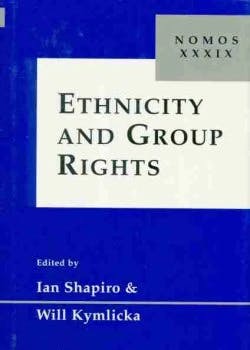NOMOS 39: Ethnicity and Group Rights
I still greet each new NOMOS volume with delight, and this one met its promise...
Karen Rothkin, Social Theory and Practice
Within Western political philosophy, the rights of groups have often been neglected or addressed in only the narrowest fashion. Focusing solely on whether rights are exercised by individuals or groups misses what lies at the heart of ethnocultural conflict, leaving the crucial question unanswered: can the familiar system of common citizenship rights within liberal democracies sufficiently accommodate the legitimate interests of ethnic citizens. Specifically, how does membership in an ethnic group differ from other groups, such as professional, lifestyle, or advocacy groups? How important is ethnicity to personal identity and self-respect, and does accommodating these interests require more than standard citizenship rights? Crucially, what forms of ethnocultural accommodations are consistent with democratic equality, individual freedom, and political stability? Invoking numerous cases studies and addressing the issue of ethnicity from a range of perspectives, Ethnicity and Group Rights seeks to answer these questions.
Cases pro and con are made with force, subtlety and clarity.... a timely and important contribution...
John King, Law and Politics Book Review
Table of Contents
-
Part 1: Meanings of Ethnicity and Group Rights
- Will Kymlicka and Ian Shapiro, "Introduction"
- Jacob T. Levy, "Classifying Cultural Rights"
-
Part 2: The Idea of Toleration
- Chandran Kukathas, "Cultural Toleration"
- Michael Walzer, "Response to Kukathas"
- Adeno Addis, "On Human Diversity and the Limits of Toleration"
- Graham Walker, "The Idea of Nonliberal Constitutionalism"
-
Part 3: The Normative Status of Ethnicity
- Thomas Pogge, "Group Rights and Ethnicity"
- S. James Anaya, "On Justifying Special Ethnic Groups Rights: Comments on Pogge"
-
Part 4: Group Rights and Group Agency
- James W. Nickel, "Group Agency and Group Rights"
- Denise G. Réaume, "Common-Law Constructions of Group Autonomy: A Case Study"
- Nomi Maya Stolzenberg, "A Tale of Two Villages (Or, Legal Realism Comes to Town)"
-
Part 5: Group Representation
- Iris Marion Young, "Deferring Group Representation"
- Andrew Stark, "What is a Balanced Committee? Democratic Theory, Public Law, and the Question of Fair Representation on Quasi-Legislative Bodies"
-
Part 6: Dynamics of Inclusion and Exclusion
- Donald L. Horowitz, "Self-Determination: Politics, Philosophy and Law"
- Deborah Kaspin, "Tribes, Regions, and Nationalism in Democratic Malawi"
- Courtney Jung and Jeremy Seekings, "'That Time Was Apartheid, Now It's the New South Africa': Discourses of Race in Ruyterwacht, 1995"
- John Kane, "From Ethnic Exclusion to Ethnic Diversity: The Australian Path to Multiculturalism"
- Cathy J. Cohen, "Straight Gay Politics: The Limits of an Ethnic Model of Inclusion"
